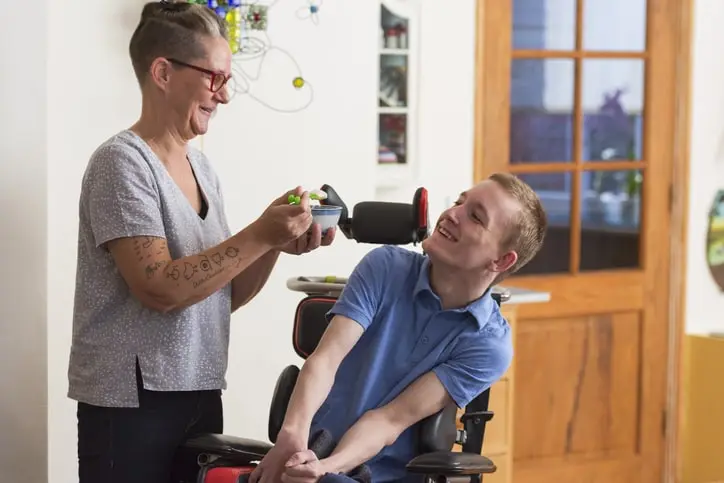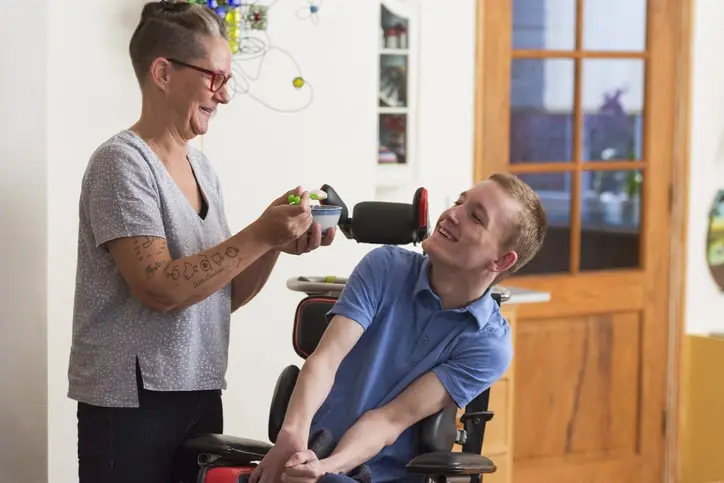What is complex care?
You (or the person you care for) may require specialised care because of complex medical needs and other personal factors. For example, you may have an acquired brain injury, an intellectual disability, a physical disability, declining health because of dementia or other complex needs.
The NDIS provides funding for those who require complex care to cover costs associated with providing services to assist them to reach their goals and objectives and live their best life.
When might you need complex care?
Everyone’s situation is different, but examples of situations that might need a complex care plan include:
-
- complex bowel care – you need someone to administer laxatives, enemas or suppositories, or to take care of your stoma (an opening in your belly) by emptying your colostomy or ileostomy bag
- specialised feeding requirements – you may be unable to feed yourself because of severe epilepsy, severe dysphagia (difficulty with swallowing), a complex physical disability, dementia or because you have difficulty communicating e.g. you require percutaneous endoscopic gastrostomy (PEG) feeding
- tracheostomy care – you may need help to breathe and rely on a ventilator (a machine that helps you breathe)
- urinary catheter care – you may need someone to insert and replace catheters and dispose of the collection bags
- need for injections or someone to administer medications – you may need to manage your diabetes or require epilepsy medication
- pressure care and wound management – you need help to change your body position so that you don’t develop pressure sores, or you need help cleaning and dressing your wounds.
What questions should I ask a potential complex care provider?
Choosing an NDIS service provider to help you with long-term or continuing complex care may seem a little daunting. Here are some questions to think about when you are deciding if a service provider is suitable for your circumstances:
-
- Do they provide 24-hour care?
- Do their staff provide live-in care?
- Do their staff have qualifications? Do their staff update their training on a regular basis?
- Do their staff have experience helping people with your specific type of complex medical condition?
- Are their staff trained in CPR or other resuscitation techniques?
- Are their staff comfortable with and do they have experience taking care of people who may have trouble communicating?
- Are their staff available after hours?
- Do they have staff that speak a second language?
Sometimes you need to shop around to find the best fit for your circumstances. Don’t hesitate to contact more than one service provider to find the services and supports that best align with your needs.
Does a support provider need special skills to provide complex care?
Registered NDIS service providers are required to show that they have relevant qualifications to provide supports and services.
Service providers delivering complex care supports and services are required to undergo certification where they are assessed against the NDIS Practice Standards.
Typically, complex care providers have staff with qualifications or specialised skills that help them care for people with complex and chronic medical conditions.
For example, people with nursing qualifications may care for those who require pressure and wound care management, complex bowel care or specialised feeding requirements.
Support workers may also be qualified and hold certifications that allow them to help people with complex medical conditions. Support workers are also able to work under the direction of a health worker.

Tailored NDIS Support
Independence Australia is committed to providing an extensive array of NDIS support services specifically tailored to fit the distinctive requirements of our NDIS participants. Explore our offerings and learn how we can assist you on your NDIS journey, propelling you towards your objectives.

Tailored NDIS Support
Independence Australia is committed to providing an extensive array of NDIS support services specifically tailored to fit the distinctive requirements of our NDIS participants. Explore our offerings and learn how we can assist you on your NDIS journey, propelling you towards your objectives.
How to provide support to a family member who requires complex care?
To provide support to a family member who requires complex care you will need to consider their individual situation. If possible, involve them in care planning to identify and prioritise their needs. You may:
- decide to have your family member formally assessed. Engaging someone with the relevant skills and knowledge will give you a clearer picture of what is required to help
- determine that the services and supports they require can only be provided by people with appropriate skills and qualifications. NDIS service providers employ people who specialise in helping those with complex care needs
- find that you need to modify your home to accommodate your family member. For example, a hoist may be needed to move your family member from the bed to their chair or you may need a larger bathroom to fit their wheelchair
- decide to undertake some training sessions so that you can help your family member when their carer is not available. For example, you might learn how to safely transfer them from their wheelchair to the shower chair.
Supporting a family member with complex care needs is sometimes difficult. It’s OK to ask for help. NDIS service providers and other community services can help you to provide the best care for your family member.
